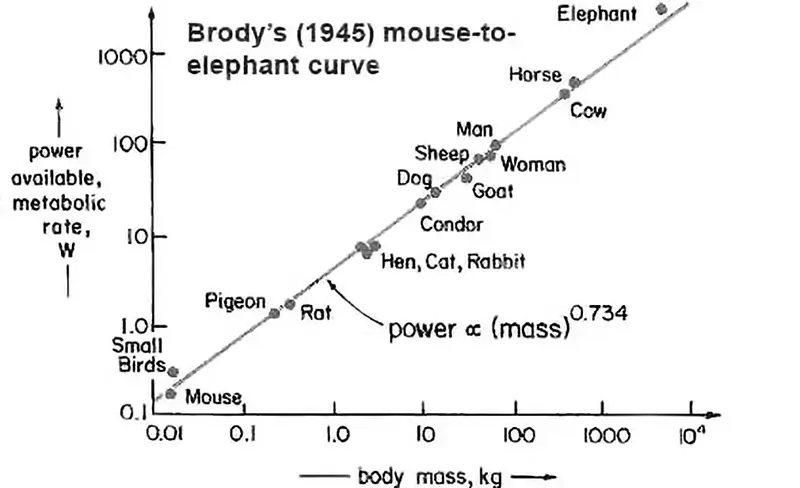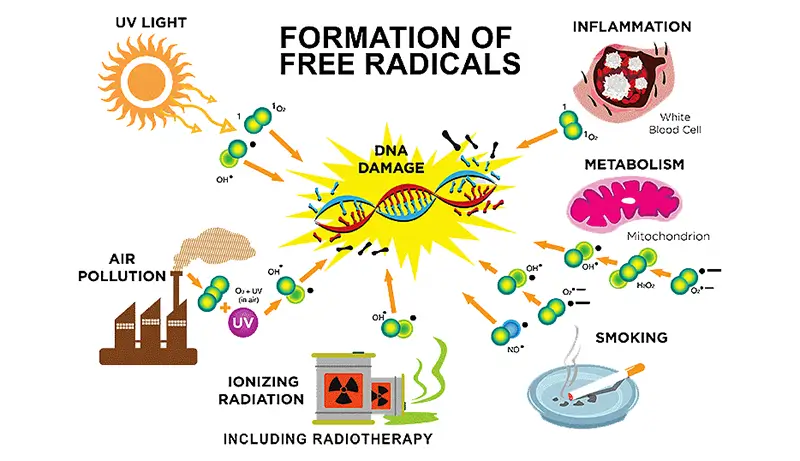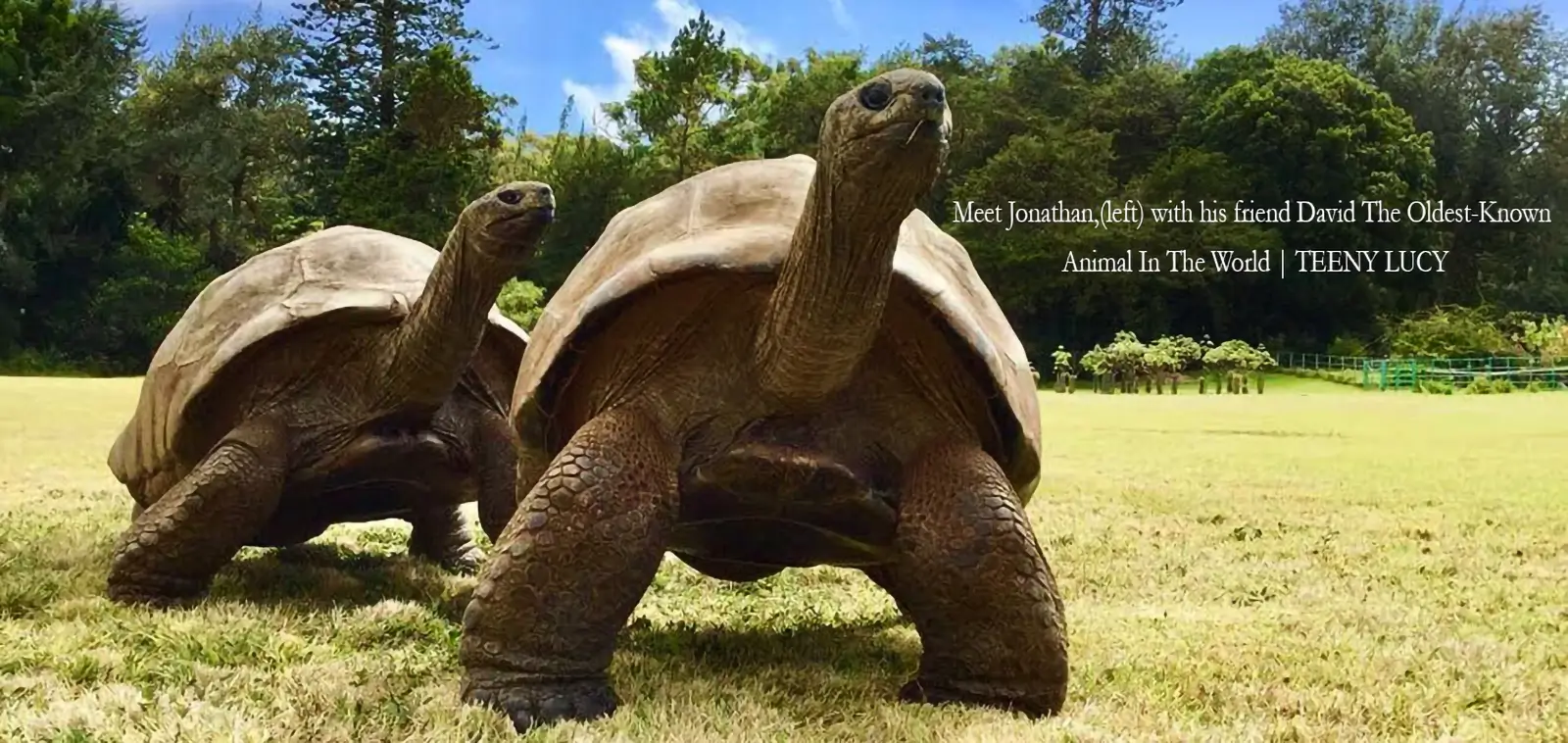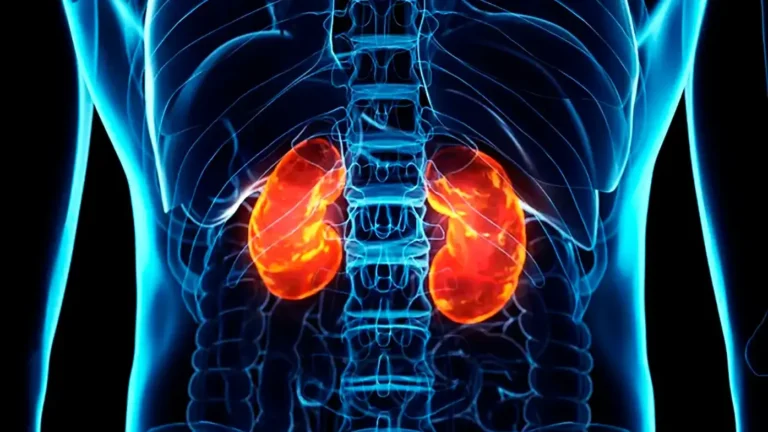Intermittent Fasting vs Calorie Restriction- Is there a difference?
There is a form of diet that is primarily designed for utilizing autophagy called intermittent fasting. To do a full-calorie restriction diet is a hard choice.
Milos Pokimica
Written By: Milos Pokimica
Medically Reviewed by: Dr. Xiùying Wáng, M.D.
Updated June 9, 2023There is a form of diet that is not related to weight loss primarily. Even some bodybuilders appear to try it. It is a diet primarily designed for utilizing autophagy called intermittent fasting.
What they try to do is to limit the intake of calories by 4 to 8 hours a day. So the rest of the time there will be fasting to tap into this mode of healing. However, there will not cut on the calories they will be just consuming them for a restricted period.
Some studies show that this too can have beneficial effects. There is truth in the statement that meal frequency is not nearly as important as the quantity and quality of food consumed. Thus logically if we still eat all of our calories in the period of 4 hours and are active the rest of the time, it is still unlikely that we will burn all of our glycogen stores because we replenish them every day.
In that sense, intermitting fasting would not be able to tap into the same healing mechanism at the level of calorie restriction. If we eat less and go into calorie restriction, it does not matter because we will be in deficit no matter when we eat. It will be a good idea to put exercise on a regimen of intermittent fasting just before the end of the fast, to deplete the glycogen stores, or we can combine all three methods. Calorie restriction with intermittent fasting with physical activity.
To go around this, there is Alternate day fasting (ADF). It involves a 24-hour fast followed by a 24-hour non-fasting period. Then there are whole-day fasting cycles that specify various ratios of fasting to non-fasting days, such as the 5:2 diet. You eat for five days, then fast on water or vegetable juices for two. So far studies done on animal models have shown that fasting improves indicators of health like blood pressure, insulin sensitivity, and inflammation.
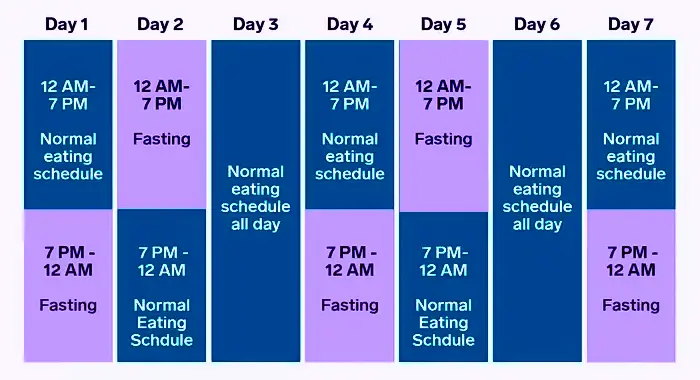
Intermittent fasting in my personal view started as a convenient way to do a calorie-restricted diet. To do a full-calorie restriction diet is a hard choice. Most of the population will not do it. The intermittent fasting line is to go and fast 1 or 2 days a week and clean our cells, reset our metabolism to take control of our hunger cravings, and so on. That will help our body to go into autophagy and high HGH levels and will start the healing mechanisms.
However, there is another essential benefit of calorie restriction, and that is lowering the basal metabolic rate. If we have a car with a million horsepower, it will burn a gallon of fuel in a millisecond, but if we have a car that runs on one horsepower, it will go much longer. It is called efficiency. When you force yourself to become more efficient in burning energy you go longer.
Calorie restriction is not calorie restriction our entire life. It is the only restriction in the beginning period. Our physiology will adapt to hunger to some extent by becoming more efficient with the calories that it has. Basal metabolic rate has the ability to slow down, but only to some extent. Our body will enter the starvation response and will go through the physiological changes that reduce metabolism in response to a lacking of food. The human body has some level of ability to adapt and structure itself known as deprivation response (i.e., metabolic adaptation).
There was a study done on eight individuals living in isolation in Biosphere 2. Biosphere 2 is an Earth Systems science research facility located in Oracle, Arizona. It was initially designed to determine the viability of closed ecological systems to support human life in outer space. The first experiment was conducted on eight individuals for two years. After the experiment was finished, the metabolic rate of these eight isolated individuals was measured and compared with a control group that initially had similar physical characteristics. The starvation response managed to reduce the metabolic rate by 180 kcal on average in daily total energy expenditure.
If you eat regularly 2000 calories and you start to restrict the calories your metabolism slows down to 1800 calories on average. Then when you came back to eat these 1800 calories, it is not a restriction anymore. It is in a sense because you are at an artificially lowered metabolic rate so if you start overeating again your basal metabolic rate will go up, but if you stay at this level you will not starve and die. You can live in this new state. People have this kind of idea about the calorie restriction diet that you are restricted continuously. In a sense, you are because you operate at a lower metabolic rate, but you are not in the physical sense or you will eventually die. And that is the reason why calorie restriction prolongs life.
Slowing down metabolism means prolonging life through efficiency. Burning fuel means stress in the form of oxidative damage to the DNA that needs to be repaired.
Can you gain muscle on caloric restriction? Probably just some level of body recomposition. If you have some kilograms to lose then lowering by 400 calories can increase muscle and lower fat deposits at the same time if you do resistance training. But if you are already calorie-restricted at the optimal level then no, your body has already lowered your metabolism as much as it can. There is a calorie in calorie out equation based on the first law of thermodynamics. It might be possible on intermittent fasting cycles. Five days of resistance training than two days of aerobic training plus fasting.
One other thing. When we start building muscle our metabolism can slow down if we do not increase calories, it will adapt to some extent. We do not need to start overeating excessively just because we go to the gym. That will give you dirty bulk. One hundred grams of flesh have around 25 grams of protein and 150 calories, and you cannot grow at the rate of 100 grams of muscle mass a day. In my opinion, when we start resistance training, it would be wise to raise calorie consumption at the level of what is burned during the exercise plus a little more, at the top 200 calories more than that. Raising it higher is excess that goes into adipose tissue, basically the waste of energy that has to be burned at some point. Overeating with the excuse:” I go to the gym”, is not a good idea.
Conclusion:
- Without any pharmacological intervention, CR improves metabolic parameters, which will benefit especially pre-diabetic and insulin-resistant patients. Also increases longevity.
- IF without calorie restriction can improve health and cellular resistance to disease especially cancer, diabetes, and other DNA damage-induced conditions same as CR but without causing weight loss. This might be beneficial for individuals that want to preserve muscle mass.
The best option would be and you can do this also to combine both at the same time. If you want to go on a diet my recommendation is not just to cut calories but to limit the time period as well. This is what I do. In the obesity epidemic, if you do not incorporate these techniques into a regular regimen of life, the health risk correlations can have serious consequences.
References:
Passages selected from a book: Pokimica, Milos. Go Vegan? Review of Science Part 1. Kindle ed., Amazon, 2018.
- Mattson, Mark P et al. “Impact of intermittent fasting on health and disease processes.” Ageing research reviews vol. 39 (2017): 46-58. doi:10.1016/j.arr.2016.10.005
- Barnosky, Adrienne R et al. “Intermittent fasting vs daily calorie restriction for type 2 diabetes prevention: a review of human findings.” Translational research : the journal of laboratory and clinical medicine vol. 164,4 (2014): 302-11. doi:10.1016/j.trsl.2014.05.013
- Liu, Kai, et al. “Intermittent Fasting: What Questions Should We Be Asking?” Physiology & Behavior, vol. 218, Elsevier BV, May 2020, p. 112827. https://doi.org/10.1016/j.physbeh.2020.112827.
- Razavi, Roghaye et al. “The alternate-day fasting diet is a more effective approach than a calorie restriction diet on weight loss and hs-CRP levels.” International journal for vitamin and nutrition research. Internationale Zeitschrift fur Vitamin- und Ernahrungsforschung. Journal international de vitaminologie et de nutrition vol. 91,3-4 (2021): 242-250. doi:10.1024/0300-9831/a000623
- Aksungar, F B et al. “Comparison of Intermittent Fasting Versus Caloric Restriction in Obese Subjects: A Two Year Follow-Up.” The journal of nutrition, health & aging vol. 21,6 (2017): 681-685. doi:10.1007/s12603-016-0786-y
Related Posts
Do you have any questions about nutrition and health?
I would love to hear from you and answer them in my next post. I appreciate your input and opinion and I look forward to hearing from you soon. I also invite you to follow us on Facebook, Instagram, and Pinterest for more diet, nutrition, and health content. You can leave a comment there and connect with other health enthusiasts, share your tips and experiences, and get support and encouragement from our team and community.
I hope that this post was informative and enjoyable for you and that you are prepared to apply the insights you learned. If you found this post helpful, please share it with your friends and family who might also benefit from it. You never know who might need some guidance and support on their health journey.
– You Might Also Like –

Learn About Nutrition
Milos Pokimica is a doctor of natural medicine, clinical nutritionist, medical health and nutrition writer, and nutritional science advisor. Author of the book series Go Vegan? Review of Science, he also operates the natural health website GoVeganWay.com
Medical Disclaimer
GoVeganWay.com brings you reviews of the latest nutrition and health-related research. The information provided represents the personal opinion of the author and is not intended nor implied to be a substitute for professional medical advice, diagnosis, or treatment. The information provided is for informational purposes only and is not intended to serve as a substitute for the consultation, diagnosis, and/or medical treatment of a qualified physician or healthcare provider.NEVER DISREGARD PROFESSIONAL MEDICAL ADVICE OR DELAY SEEKING MEDICAL TREATMENT BECAUSE OF SOMETHING YOU HAVE READ ON OR ACCESSED THROUGH GoVeganWay.com
NEVER APPLY ANY LIFESTYLE CHANGES OR ANY CHANGES AT ALL AS A CONSEQUENCE OF SOMETHING YOU HAVE READ IN GoVeganWay.com BEFORE CONSULTING LICENCED MEDICAL PRACTITIONER.
In the event of a medical emergency, call a doctor or 911 immediately. GoVeganWay.com does not recommend or endorse any specific groups, organizations, tests, physicians, products, procedures, opinions, or other information that may be mentioned inside.
Editor Picks –
Milos Pokimica is a health and nutrition writer and nutritional science advisor. Author of the book series Go Vegan? Review of Science, he also operates the natural health website GoVeganWay.com
Latest Articles –
Top Health News — ScienceDaily
- The overlooked nutrition risk of Ozempic and Wegovyon February 4, 2026
Popular weight-loss drugs like Ozempic and Wegovy can dramatically curb appetite, but experts warn many users are flying blind when it comes to nutrition. New research suggests people taking these medications may not be getting enough guidance on protein, vitamins, and overall diet quality, increasing the risk of muscle loss and nutrient deficiencies.
- A 25-year study found an unexpected link between cheese and dementiaon February 4, 2026
A massive Swedish study tracking nearly 28,000 people for 25 years found an unexpected link between full-fat dairy and brain health. Among adults without a genetic risk for Alzheimer’s, eating more full-fat cheese was associated with a noticeably lower risk of developing the disease, while higher cream intake was tied to reduced dementia risk overall. The findings challenge decades of low-fat dietary advice but come with important caveats.
- MIT’s new brain tool could finally explain consciousnesson February 4, 2026
Scientists still don’t know how the brain turns physical activity into thoughts, feelings, and awareness—but a powerful new tool may help crack the mystery. Researchers at MIT are exploring transcranial focused ultrasound, a noninvasive technology that can precisely stimulate deep regions of the brain that were previously off-limits. In a new “roadmap” paper, they explain how this method could finally let scientists test cause-and-effect in consciousness research, not just observe […]
- Why heart disease risk in type 2 diabetes looks different for men and womenon February 4, 2026
Scientists are digging into why heart disease risk in type 2 diabetes differs between men and women—and sex hormones may be part of the story. In a large Johns Hopkins study, men with higher testosterone had lower heart disease risk, while rising estradiol levels were linked to higher risk. These hormone effects were not seen in women. The results point toward more personalized approaches to heart disease prevention in diabetes.
- Sound machines might be making your sleep worseon February 4, 2026
Sound machines may not be the sleep saviors many believe. Researchers found that pink noise significantly reduced REM sleep, while simple earplugs did a better job protecting deep, restorative sleep from traffic noise. When pink noise was combined with outside noise, sleep quality dropped even further. The results suggest that popular “sleep sounds” could be doing more harm than good—particularly for kids.
- This unexpected plant discovery could change how drugs are madeon February 3, 2026
Plants make chemical weapons to protect themselves, and many of these compounds have become vital to human medicine. Researchers found that one powerful plant chemical is produced using a gene that looks surprisingly bacterial. This suggests plants reuse microbial tools to invent new chemistry. The insight could help scientists discover new drugs and produce them more sustainably.
- A hidden cellular process may drive aging and diseaseon February 3, 2026
As we age, our cells don’t just wear down—they reorganize. Researchers found that cells actively remodel a key structure called the endoplasmic reticulum, reducing protein-producing regions while preserving fat-related ones. This process, driven by ER-phagy, is tied to lifespan and healthy aging. Because these changes happen early, they could help trigger later disease—or offer a chance to stop it.
PubMed, #vegan-diet –
- Diet type and the oral microbiomeon February 2, 2026
CONCLUSION: The diet-oral microbiome-systemic inflammation axis is bidirectional and clinically relevant. Understanding both direct ecological regulation and indirect metabolic effects is essential to support precision nutrition strategies aimed at maintaining oral microbial balance and systemic inflammatory risk mitigation.
- Consensus document on healthy lifestyleson January 22, 2026
Proteins are a group of macronutrients that are vital to our lives, as they perform various functions, including structural, defensive and catalytic. An intake of 1.0-1.2 g/kg/body weight per day would be sufficient to meet our needs. Carbohydrate requirements constitute 50 % of the total caloric value and should be obtained mainly in the form of complex carbohydrates. In addition, a daily intake of both soluble and insoluble fiber is necessary. Regular consumption of extra virgin olive oil […]
- Vitamin B12 and D status in long-term vegetarians: Impact of diet duration and subtypes in Beijing, Chinaon January 21, 2026
CONCLUSIONS: This study reveals a dual challenge among Beijing long-term vegetarians: vitamin B12 deficiency was strongly associated with the degree of exclusion of animal products from the diet (veganism), while vitamin D deficiency was highly prevalent and worsened with longer diet duration. The near-universal vitamin D deficiency observed in this study suggests that, in the Beijing context, the risk may extend beyond dietary choice, potentially reflecting regional environmental factors;…
- Nutritional evaluation of duty meals provided to riot police forces in Germanyon January 13, 2026
Background: The primary role of the German riot police is maintaining internal security. Due to challenging working conditions, riot police forces face an elevated risk of various diseases. During duty, forces are provided with meals. A balanced diet can reduce the risk of some of these diseases and contribute to health-promoting working conditions. Aim: First evaluation of the nutritional quality of duty meals in Germany based on German Nutrition Society recommendations (DGE). Methods: In…
- Iodineon January 1, 2006
Iodine is an essential trace nutrient for all infants that is a normal component of breastmilk. Infant requirements are estimated to be 15 mcg/kg daily in full-term infants and 30 mcg/kg daily in preterm infants.[1] Breastmilk iodine concentration correlates well with maternal urinary iodine concentration and may be a useful index of iodine sufficiency in infants under 2 years of age, but there is no clear agreement on a value that indicates iodine sufficiency, and may not correlate with […]
Random Posts –
Featured Posts –
Latest from PubMed, #plant-based diet –
- From paddy soil to dining table: biological biofortification of rice with zincby Lei Huang on February 4, 2026
One-third of paddy soils are globally deficient in zinc (Zn) and 40% of Zn loss in the procession from brown rice to polished rice, which results in the global issue of hidden hunger, e.g., the micronutrient deficiencies in the rice-based population of developing countries. In the recent decades, biofortification of cereal food crops with Zn has emerged as a promising solution. Herein, we comprehensively reviewed the entire process of Zn in paddy soil to human diet, including the regulatory…
- Molecular Characterization of Tobacco Necrosis Virus A Variants Identified in Sugarbeet Rootsby Alyssa Flobinus on February 3, 2026
Sugarbeet provides an important source of sucrose; a stable, environmentally safe, and low-cost staple in the human diet. Viral diseases arising in sugarbeet ultimately impact sugar content, which translates to financial losses for growers. To manage diseases and prevent such losses from occurring, it is essential to characterize viruses responsible for disease. Recently, our laboratory identified a tobacco necrosis virus A variant named Beta vulgaris alphanecrovirus 1 (BvANV-1) in sugarbeet…
- Nutrition in early life interacts with genetic risk to influence preadult behaviour in the Raine Studyby Lars Meinertz Byg on February 3, 2026
CONCLUSIONS: Nutrition in early life and psychiatric genetic risk may interact to determine lasting child behaviour. Contrary to our hypothesis, we find dietary benefits in individuals with lower ADHD PGS, necessitating replication. We also highlight the possibility of including genetics in early nutrition intervention trials for causal inference.
- Effect of the gut microbiota on insect reproduction: mechanisms and biotechnological prospectsby Dilawar Abbas on February 2, 2026
The insect gut microbiota functions as a multifunctional symbiotic system that plays a central role in host reproduction. Through the production of bioactive metabolites, gut microbes interact with host hormonal pathways, immune signaling, and molecular regulatory networks, thereby shaping reproductive physiology and fitness. This review summarizes recent advances in understanding how gut microbiota regulate insect reproduction. Accumulating evidence demonstrates that microbial metabolites…
- Rationale and design of a parallel randomised trial of a plant-based intensive lifestyle intervention for diabetes remission: The REmission of diabetes using a PlAnt-based weight loss InteRvention…by Brighid McKay on February 2, 2026
CONCLUSIONS: This trial will provide high-quality clinical evidence on the use of plant-based ILIs to address the epidemics of obesity and diabetes to inform public health policies and programs in Canada and beyond.
- Diet type and the oral microbiomeby Daniel Betancur on February 2, 2026
CONCLUSION: The diet-oral microbiome-systemic inflammation axis is bidirectional and clinically relevant. Understanding both direct ecological regulation and indirect metabolic effects is essential to support precision nutrition strategies aimed at maintaining oral microbial balance and systemic inflammatory risk mitigation.
